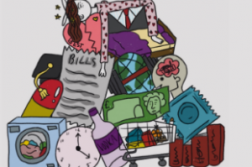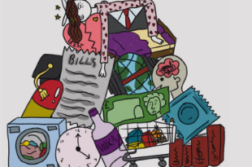When discussing addiction, the first thing that comes to most people’s minds are drugs and alcohol, or maybe even gambling. However, it is indeed possible to become addicted to social media sites like Instagram and Facebook. We live in a society where our whole lives are posted on social media platforms; we have reached the point where many of us question if something was even worth doing if it was not posted all over Instagram and Facebook accounts, and I have first-hand experience of this.
It reached an all time high on my year abroad, when it got to a point where I would go on Facebook instead of going to sleep at a respectable time. I kept telling myself I wasn’t addicted, because social media addiction isn’t a real thing – but it is, I promise you. I was hooked and living a digital life rather than a life in the real world. I would see everyone back at home in England having the most amazing lives and felt like I was missing out while aimlessly scrolling. What I forgot to remind myself is that none of this was real. It was, however, having a significant impact on my mental health.
We build an online persona, each and every one of us – a persona where our lives are perfect. Let’s be honest, would any of us take a video of ourselves crying in our pyjamas with smudged mascara because our cat Snuggles had recently passed away and then upload it? Probably not. Maybe we’re all secret narcissists, who knows?
But what are the implications of social media addiction?
Firstly, social media addiction can have implications for our mental health and cause anxiety and depression. The fact that social media users have constant access to people’s everyday lives twenty four hours a day can make us feel the concept of FOMO (Fear Of Missing Out), which can make people feel like they are missing out on rewarding activities. This feeling can be associated with lower mood and life satisfaction levels which both can often lead to depression and anxiety.
Furthermore, social media sites (Instagram being the main culprit) bombard young people with images of what society views as “perfect”, whatever that means. This can cause young people to start to feel pressure to try to conform to these unrealistic beauty standards, which is of course extremely unhealthy. This is not just a problem for females either. Males also see other men on their feeds with six packs and chiseled jaw lines. What we all need to remember is that all of these images are heavily edited and are not what real humans look like.
Finally, another problem that social media addiction can cause is sleep problems, just as I mentioned before. It is common for people who are addicted to social media to spend long periods of time on these sites, and this can mean interrupted sleep. A large percentage of the population who use social media are young adults and teens, and not getting adequate sleep causes all sorts of problems, like finding it difficult to study in school, college or university or difficulties concentrating at work. Lack of sleep can also affect our physical health; getting enough sleep is imperative for optimum physical health as enough sleep even helps build our immune systems and a lack of it can cause weight gain and an increased risk of heart problems.
A social media cleanse can help with coping with addiction to social media. What is a social media cleanse you may ask? Well, it is just a sophisticated way to say that you are removing yourself from social media. This means deactivating or deleting your accounts and not using them for a significant period of time. This can be beneficial, not just for people who are struggling with an addiction to social media, but for anyone who feels that social media might be getting in the way of them living their lives in the real world. My own experience of attempting a social media cleanse was extremely difficult, but what I found was that as time went on it became easier and easier, my mental health improved significantly and I had so much more free time. which I used to fulfill my passion for writing. I also realised that I didn’t need social media to improve my life – using it was actually having the opposite effect.
But what does this all mean? Well, awareness is key. If this article has achieved anything, it has hopefully raised awareness of the problem, especially in teens and young adults. It means that as a society we need to be more aware of the problems of social media addiction and actually consider it a real problem of modern-day society. We also need to be less dismissive if a friend or family member reaches out for help for social media addiction too.



